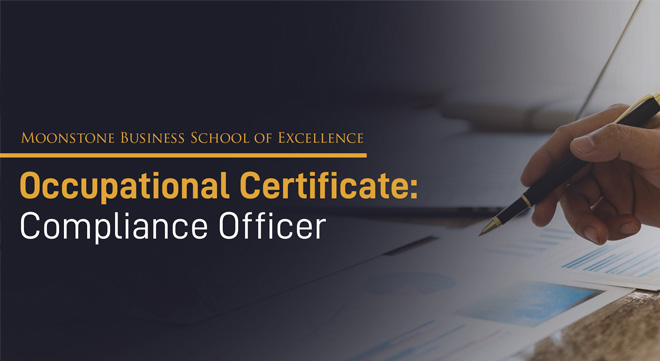Going forward, companies that support their employees in completing an Occupational Certificate: Compliance Officer can benefit on three fronts.
On 20 July, the Quality Council for Trades and Occupations (QCTO) gave approval for this 12-month certificate to be included under the umbrella of Seta (Sector Education and Training Authority) learnership qualifications. At present, 183 registered learnerships with “compliance officer” are listed on the QCTO’s website.
According to Mikay Goliath, external skills development and employment equity specialist at Moonstone Information Refinery, employers offering learnerships can enjoy substantial benefits such as tax rebates and black economic empowerment points. Companies paying the Skills Development Levy (SDL) can also apply for Seta funding to train and host unemployed youth, particularly those with disabilities.
Goliath explains that employers with a total salary bill of R500 000+ over a 12-month period are required to pay SDL levies (1% from their monthly payroll) to the South African Revenue Service (Sars) every month, according to the Skills Development Levy Act. However, any employer whose total remuneration to all its employees over the next 12-month period doesn’t exceed R500 000 can also use this benefit to submit and claim.
The levies are paid over to the Seta (of which there are 21) to encourage employers to train and upskill their employees. By complying with the legal and procedural requirements, employers may claim up to 70% of the SDL back from their Seta.
The benefits of paying SDL include being able to claim back 20% of the levy in a mandatory grant, 50% in discretionary grants (learnerships, skills programmes, apprenticeships, workplace experience placements, internship and bursaries), and tax rebates on registered learnership programmes.
With the Occupational Certificate: Compliance Officer now recognised as a learnership, Setas – such as Fasset (finance, accounting, management consulting and other financial services sector) and Inseta (insurance sector) – can potentially start paying out discretionary grants.
“Companies who submit their Workplace Skills Plan and Annual Training Report can now apply for discretionary grants for a learnership. This could be up to R50 000 per learner,” Goliath says.
When it comes to tax benefits, she says companies could qualify for a tax rebate of up to R40 000 for an abled-body learner and up to R60 000 for a disabled learner.
“Once they have completed their 12 months – and it needs to be a 12-month learnership – the company can claim back those funds from Sars.”
And, Goliath says, if the companies retain that talent after the completion of the learnership, they could earn a maximum of 25 points on their B-BBEE scorecard.
“The B-BBEE scorecard is measured out of 100 points. Twenty-five of those points are allocated to skills development, and therefore, this could be a major plus to companies who wish to improve their scorecard.”
Increased need for compliance officers
These Seta learnership qualifications are offered by training providers that are accredited to offer registered qualifications by the QCTO. Moonstone Business School of Excellence (MBSE) is one such provider.
Compliance officers generally provide compliance services to the management of a company, to assist management in discharging their responsibilities in complying with various regulatory and legislative requirements.
Monique Brummer, operations manager of MBSE, says due to the growing maze of laws, regulations, licensing and permits, there is an increase in the need for compliance officers across industries.
“Every company or organisation is required to comply with these various regulations, thus they need an expert at their disposal with knowledge and experience in legal matters, compliance risk management, as well as the compilation, implementation, and reporting of compliance strategies,” Brummer says.
MBSE’s Occupational Certificate: Compliance Officer (NQF level 6) qualification is not only aimed at preparing a student for compliance within the financial sector, but also compliance departments from other sectors.
Qualified students will be able to conduct enterprise-wide risk management, apply compliance principles, commit to compliance practices, design, and implement compliance plans and strategies, conduct compliance monitoring, and interact with industry role-players.
The Occupational Certificate: Compliance Officer is a recognised qualification by the Financial Sector Conduct Authority for Category I, Key Individuals.
The closing date for applications for the first semester of next year is 29 January 2024.
Click here for more information and to apply.
Cutting through the red tape
While the rewards – for both employers and employees – of offering this certificate as a learnership are many, Goliath says that setting up a learnership can be administratively intensive.
“A learnership is a tri-party agreement between the host employer, Seta, and the training provider. There are multiple phases a host company needs to go through to ensure they run a successful learnership, including but not limited to putting learnership agreements in place, identifying a mentor, identifying a learner (employed or unemployed), and choosing a training provider (must be Seta-accredited).”
In addition to assisting clients in meeting compliance requirements when claiming on the SDL levy or applying for tax rebates, these are all tasks with which Moonstone’s Workforce Solutions department can help.
Goliath describes Workforce Solutions as a go-between the Seta and the company.
The services offered by Workforce Solutions include the following:
- Development of a skills development policy.
- Act as a contact person between the employer and the Seta and serve as a resource.
- Establish, train, and consult quarterly with the organisation’s Skills Development Committee.
- Skills audits and training needs analysis.
- Aligning skills development activities with Sector Skills Plan and B-BBEE requirements.
- Submission of the Workplace Skills Plan and Annual Training Report.
- Implementation of the training plan (sourcing training providers and booking training).
- Plan, submit, and manage discretionary grants.
- Seta transfers.
Click here for more information about how Workforce Solutions can assist your business.



